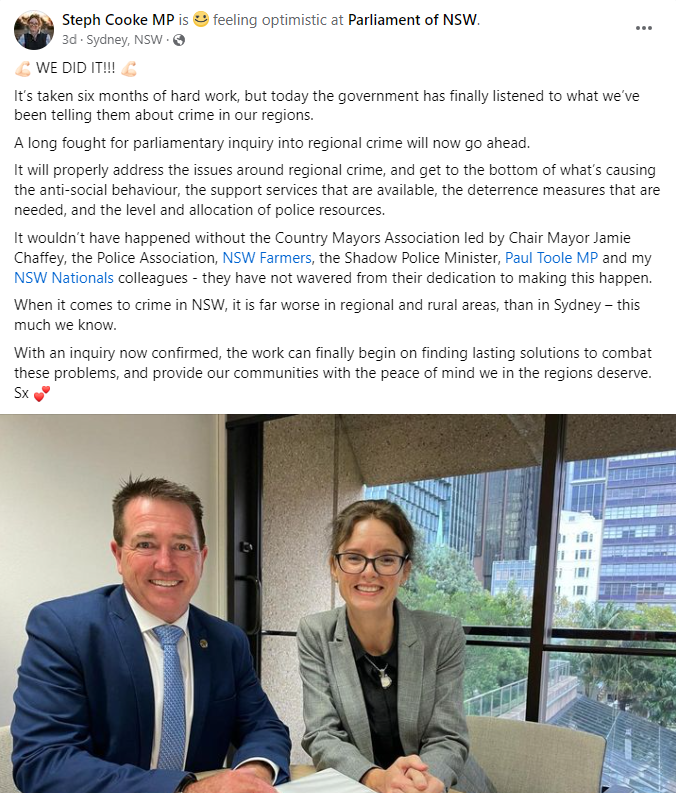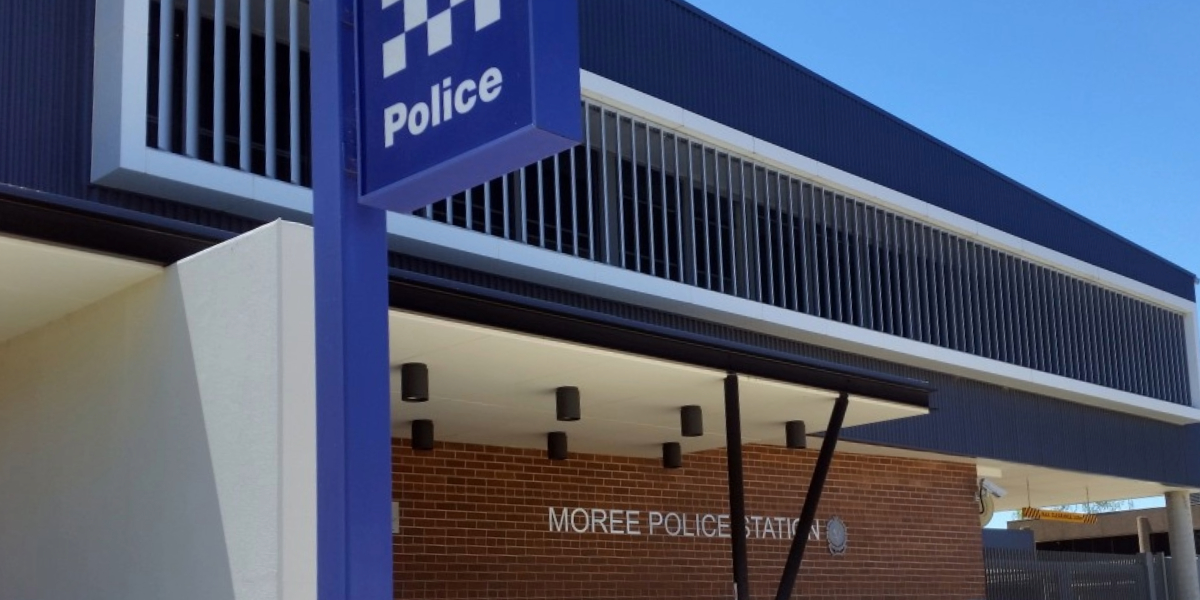National Party politicians have been congratulating each other on the establishment of a new inquiry into community safety and crime in regional NSW this week.
The call for a regional crime inquiry from the Country Mayor’s Association in October of last year was initially rejected by the Minns Government, with Police Minister Yasmin Catley not wanting to pull police officers off the beat to give evidence to such an inquiry when they were short around 1500 police officers. The Country Women’s Association (CWA), the Police Association of NSW and NSW Farmers had also backed the CMA/Nationals call with many areas experiencing increases in crime, particularly theft.
Premier Chris Minns then visited Moree with local MP Adam Marshall in February to discuss the issues and announced $13.4 million for a targeted place-based response in Moree to address crime, support young people and improve community safety. Described as ‘pilot’ to test initiatives before being rolled out to other areas, that apparently wasn’t good enough for the Nationals, who released a series of coordinated press releases with almost identical language about how their area “couldn’t wait”.
What about me…
NSW Nationals Leader Dugald Saunders called for immediate action for other towns that are seeing similar issues to Moree, delivering the Premier’s office a letter, signed by every Nationals Member in the NSW Parliament, calling for help for “every other bush community in the state”.
“It’s good to see the Minns Labor Government has finally started to listen and has started on that path, but now we need to know what measures it will put in place help people right now,” Mr Saunders said.
“The government’s package might be good for Moree, but what about our region and the rest of the country NSW suffering rising rates of youth crime?” Member for Oxley, which includes the crime hotspot of Kempsey, Michael Kemp said.
“I acknowledge the Government announced an anti-crime pilot program for Moree to help find solutions in that regional town, but that is not much use if you live in the Richmond or Clarence valleys or other regional communities,” Clarence MP Richie Williamson said.
“I believe the inquiry must visit our region to hear firsthand from communities who have been experiencing frightening home invasions, rising levels of violence, and stolen vehicles and valuables – they must come to Tamworth and Gunnedah,” Member for Tamworth Kevin Anderson said.
Member for Northern Tablelands, Adam Marshall, chimed in too.
“Of course I remain incredibly grateful to Premier Chris Minns for the support and assistance shown for Moree, but this in no way negated the need for a broader and more in-depth examination of these issues across all rural and regional areas.”
The Nationals went so far as to establish a political campaign website so that people could tell them their own crime stories.
Inquiry to focus on drivers of crime
On March 20th, the NSW Parliamentary Committee on Law and Safety announced it would hold the inquiry into ‘community safety in regional and rural communities’. The terms of reference for the inquiry include:
- the drivers of youth crime across regional and rural NSW, particularly since the COVID pandemic
- how a whole of government approach can reduce the drivers and root causes of youth crime
- the wraparound and diversionary services available for youth and families in the regions and rural areas
- staffing levels and workforce issues, including police staffing
- recidivism rates in regional and rural areas
Police Minister Yasmin Catley told the parliament that they were not blind to the concerns of reginal communities.
“I want to acknowledge that this is a big problem and it has been a big problem for decades. In fact, we’re seeing similar issues with crime in states and territories right across Australia.”
“What we have heard loud and clear is that we need to do more as a government to break the cycle of crime: prevention, diversion and disruption,” she said.
“This is about getting kids the help that they need to steer them away from crime and the justice system in this state.”
“The problems they are complex they are entrenched, but let me tell you, the NSW Police are doing everything that we ask of them.”
Self-congratulations and short memories
Many Nationals MPs seemed to think this was a significant political win, and were congratulating each other their efforts.
“Make no mistake, this inquiry is all thanks to the hard work of Jamie Chaffey and the Country Mayors Association who, along with the Police Association, NSW Farmers, the CWA, and members of the opposition, called on the government to once and for all, take action on combatting regional crime,” Adam Marshall said.
‘Pressure from the NSW Nationals has forced the Minns Labor Government into calling an inquiry into regional and rural crime,’ read the party’s website.
“We did it!” declared Steph Cooke on her Facebook page.

And that somehow the last six months was too long.
“This has been a hard-fought battle over the past six months,” Michael Kemp said.
“Essentially, we are now six months behind where we could have been if the government had only listened to those of us giving a voice to residents in regional communities, who are tired of being treated like second-class citizens when it comes to law and order,” Member for Cootamundra Steph Cooke said.
“I certainly welcome the inquiry, but the hard work has only just begun; we’ve lost six valuable months while the government dragged its feet on this, so it’s important that we mobilise now, and create real momentum towards achieving meaningful outcomes for the regions,” Adam Marshall said.
“It has taken six months for Labor to get off their hands and do something about rising crime in the regions,” Shadow Police Minister Paul Toole said.
“Given the amount of time it has taken to get started, I doubt we would see any results from the inquiry for another year.”
The inquiry is not due to report until February 2025, so results from the inquiry will be more than a year away.
History repeats
The intense crime problem in Moree is not at all new. The Sydney Morning Herald dubbed Moree the state’s crime capital and did a series of articles on the social and cultural issues that create the high crime environment in 2014, shortly after Mike Baird became Premier, during the first term of Adam Marshall’s reign as the Member for Northern Tablelands when he had his own troubles with he law. This masthead reported on the issue and polled New Englanders about their fear of crime in our first six weeks of publishing, more than six months before the CMA call for an inquiry.
A stand-out voice amongst the noise this week has been federal member for Parkes, which includes Moree, Mark Coulton. In an opinion piece, published in the Daily Telegraph, he joins with Police Minister Catley in acknowledging the crime issues happening in places like Moree “have been happening for decades”.
However, it appears that Mr Coulton is also in need of a history book, as he goes on to advocate for the removal of children from their families as a possible solution.
“It’s time we address the elephant in the room, which is that authorities are hesitant to intervene in these cases because of the sensitivities and complexities surrounding the Stolen Generations and other forced historical adoption practices,” Mr Coulton wrote.
“While I agree that removing a child from their family should be a very last resort, there are times when this would be in the best interests of the child.”
Comments from the Nationals MPs also indicate they want a tougher judicial approach on youth crime, more police, and tightening of bail arrangements, despite the decades of evidence that a ‘tough on crime’ approach does not work, particularly with young people.
“I want to see the regional crime inquiry start looking at key areas for Oxley like allocating more police resources, ways to invest into our local grassroot services that know and understand our young people, and ways to tighten our legal and judicial framework,” Mr Kemp said.
“This issue of offenders continually being bailed by the courts is a massive frustration for local police, victims of crime and the general community and statically is driving the vast majority of criminal activity in the region,” Mr Marshall said.
“Our community has a right to feel safe in our homes and a recent rise in youth crime has taken that right away from many in our community,” Mr Anderson said.
The community safety in regional and rural communities inquiry is accepting public submissions until 31 May 2024. To read the inquiry’s terms of reference, and to make a submission, please visit the Committee’s webpage.
Like what you’re reading? Support The New England Times by making a small donation today and help us keep delivering local news paywall-free. Donate now.

